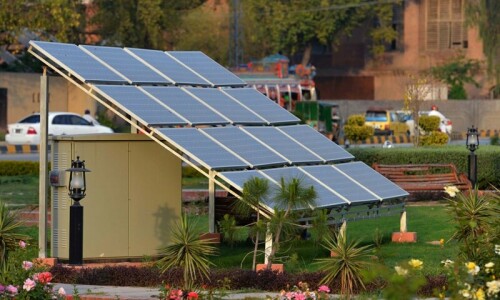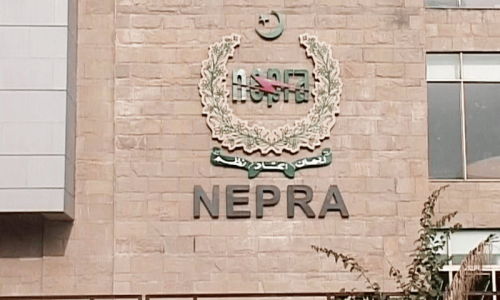• Users to get 18-50pc discount on additional usage over previous years’ levels
• Minister says package announced after IMF approval
ISLAMABAD: The government on Friday announced cheaper electricity rates for residential, commercial and industrial consumers on incremental usage over three winter months (December to February) in an effort to stimulate power consumption amid high tariffs and economic downturn.
Under the Bijli Sahulat Package, consumers will receive an 18-50 per cent discount on additional usage over previous years’ levels, with rates varying based on category and consumption slabs. The International Monetary Fund (IMF) was consulted by the government before the announcement and it approved the incentive package, according to Finance Minister Muhammad Aurangzeb.
Prime Minister Shehbaz Sharif hailed the package as a “big good news for the country” at an Iqbal Day function. Earlier in the day, Power Minister Owais Ahmad Khan Leghari was scheduled to announce the package at a press briefing, but the event was abruptly cancelled without notice to attending journalists.
Electricity tariffs in the country have increased by more than 50pc over the past two years on average while industrial output has declined due to escalating energy costs and challenging economic conditions at home and abroad.
Many consumers have switched to cheaper alternatives like solar power, while others have struggled to cope, leaving policymakers in a difficult position amid tough IMF conditions, rising circular debt and unaffordable electricity costs.
The resulting drop in electricity demand has led to a sharp decline in consumption, making demand forecasts unpredictable. Power generation in September was reported to be 9.9pc below projections, with demand 6.4pc lower year-on-year and 5.2pc lower than in August. Overall, electricity generation for the first quarter (July-September) of this fiscal year was 8pc below the same period last year.
The cheaper rates under the incentive package would be limited only to the incremental consumption for three sectors, meaning that the historical consumption would be charged at the existing rates without any discount.
Moreover, the package will apply only to incremental usage up to 25pc above the reference benchmark. Any consumption exceeding this threshold will be billed at the standard government-notified tariff.
The additional consumption would be worked out under a formula based on last three years’ billed units. For this, historical consumption for the last three years will be higher than last year’s consumption or average weighted average consumption on a rolling basis, with 50pc weight to FY24, 30pc to FY23, and 25pc to FY22.
At present, base rates for domestic consumers range from Rs37.49 to Rs52.07 per unit. Under the new package, additional consumption will be charged at Rs26.07 per unit, providing savings of 30-50pc compared to existing rates.
For commercial consumers, base rates range from Rs39.53 to Rs48.78 per unit, while incremental usage will be billed at Rs26.07 per unit — a discount of 34-47pc.
Industrial consumers, whose rates are between Rs31.79 and Rs41.12 per unit, will also pay Rs26 per unit on additional consumption, leading to savings of 18-37pc.
The prime minister said the incentive package would provide a “quantum jump” to economic growth and encourage agricultural, industrial and commercial activities through additional consumption at cheaper rates. He said the package would be applicable for December, January and February.
The power division said it recognised that electricity demand peaked during summer and significantly dropped in winter and hence the package aimed to encourage higher consumption during the low-demand winter season by offering reduced electricity rates.
Giving an example, the power division said that if an industrial consumer, currently paying Rs40 per unit for 100,000 units, increases its consumption by 25,000 units at Rs26.07 per unit, the average cost of electricity for that consumer would come down to Rs37.21 per unit, lower by 7.5pc.
The power division hoped that the package would be an attractive option for water and space heating and other energy needs that would otherwise rely on gas or other sources. It said it was an attempt to balance electricity demand across seasons and provide economic advantages to consumers.
Published in Dawn, November 9th, 2024















































